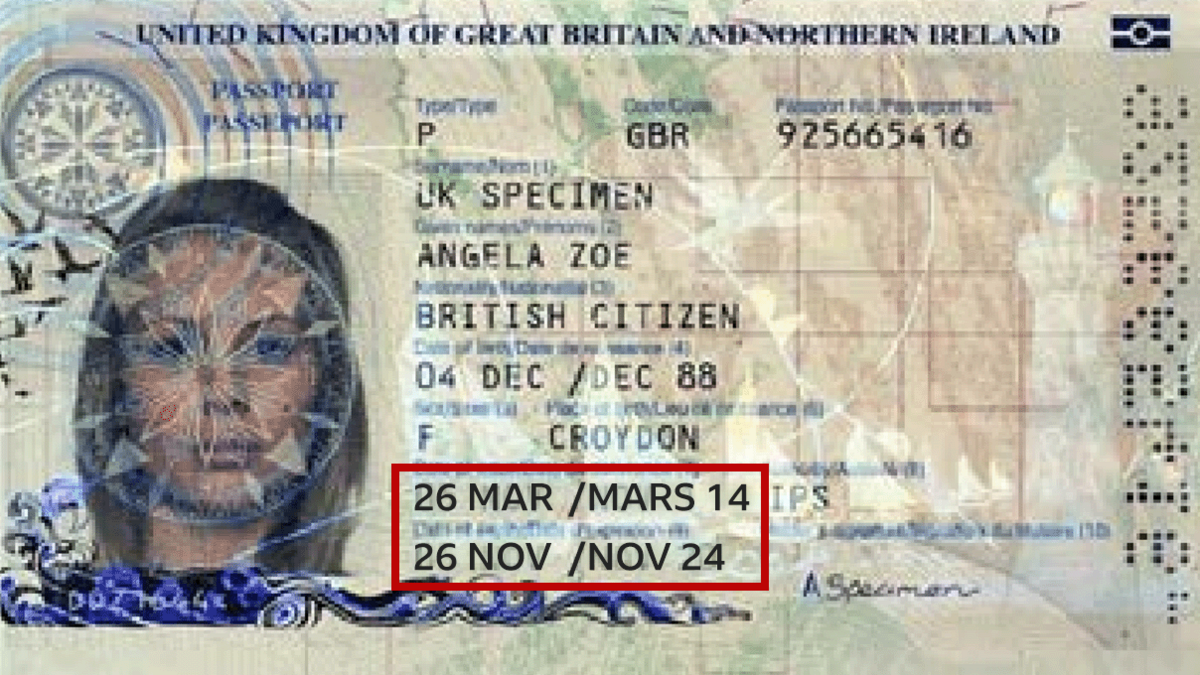Holidaymakers going to EU caught out by 10-year-passport rule
- Published

Holidaymakers travelling to the EU are being warned not to get caught out by the "passport 10-year rule".
UK travellers used to be able to carry up to nine months from an old passport over on to a new one. But post-Brexit, EU countries will not accept passports issued more than 10 years ago.
Up to 32 million people applied for passports before the new rules, but it is unknown how many have been affected.
One of them is Nathan Barnes who was refused boarding on a flight to France.
Mr Barnes, a 31-year-old paramedic from Norwich, was on his way to Limoges with his fiancée to visit family.

Nathan Barnes could not board his flight to France as his passport was issued more than 10 years ago
Despite checking in for the flight online, and going through security and passport control, he was stopped at the departure gate.
"My passport had been issued more than 10 years previously," he said. "They were very matter of fact about it, they just said 'sorry you can't board, off you pop'."
"I was gutted, surprised really. We had checked in online and thought it was fine," he added.
Since the UK left the EU, travellers heading to all countries within the bloc - and including Iceland, Norway, Lichtenstein and Switzerland, but not Ireland - must have a passport which was issued less than 10 years before their departure date.
It must also be valid for three months after their planned return date.
Passports issued after 2018 are valid for exactly 10 years.
However, if a UK passport was issued before September 2018, it could be valid for up to 10 years and nine months.
This is because before 2018 the passport office used to add up to nine months from an old passport on to a new one.
As a result, some people have passports that have not officially expired, and are valid for travel in the rest of the world, but not in parts of Europe because they were issued more than ten years ago.

Are you affected by the 10-year rule?
Check if your passport was issued before September 2018
Has it passed its 10-year anniversary? Even if it has several months left to run, it is invalid for travel to all EU countries with the exception of Ireland as well as Iceland, Norway, Lichtenstein and Switzerland
If you are going to these countries you must have a passport issued less than 10 years before your departure date
If your passport is invalid you can try and book an emergency appointment online, external at your nearest passport office which offers a one-day and a one-week fast track service
Otherwise passports can be renewed online, external by HM Passport Office or by using a paper application from certain Post Offices
It can take up to three weeks to renew a passport from the UK

'Catches people out'
"The '10-year-rule' is a problem that continues to catch people out", said Rory Boland, the Travel Editor at Which?
"What's really important is that you check your passport validity and expiry date when booking your holiday.
"Not when you go to check-in, and certainly not when you travel to the airport, because that's when people are continually finding that their passport is out of date and it's often then too expensive, and too complicated to save their holiday."
BBC News asked the major airlines and holiday operators for data on the number of passengers who are refused boarding, but those that responded said they did not keep detailed records.
'Holidays lost'
Jane Opher thinks the airlines could be doing more to warn people about the problem when they first book or when they check in.
The 61-year-old architect from London was due fly to Barcelona with her partner at the end of February.
They had both checked in online, gone through security and had lunch at the airport only to be refused boarding at the gate because her passport was issued on 10 February 2014, more than ten years ago, even though it does not officially expire until 10 August 2024.
"It was very stressful - I was traumatised - being told I couldn't board," she told the BBC.

Jane Opher and her partner Damir had to abandon their trip to Barcelona as her passport was more than ten years old
"It was also humiliating to have to be escorted back through the airport like a criminal."
She was left hundreds of pounds out-of-pocket.
Simon Calder, travel correspondent at the Independent, says based on his own research "easily a couple of hundred people a day" are being turned away from their flights.
"Across the year you could easily find that there's over 100,000 people who lose their holidays as a result of these rules," he said.
He has written to the airlines, urging them to do more to make people aware, particularly if someone is checking in and inputting their advanced passenger information, often weeks before their travel date.
Airlines UK told us there was no guarantee that potentially invalid passport details would be picked up in advance, and said airlines do provide reminders and links.
It said it was the responsibility of the person travelling to ensure they have a valid travel document.
For those people who are due to travel this weekend and spot a problem with their passport Mr Calder told BBC Breakfast: "I'm afraid all you can do at this stage is try and get an emergency appointment and see if you can get a passport turned around.
"But if you're travelling later, maybe in the May bank holidays or the summer holidays then you've got time on your side and just to stress... it's only the EU that cares about the issue date, if you're going to America, Australia, Tunisia they say your passport's valid up to and including the expiry date."
If someone is turned back at the airport Mr Calder said they were "absolutely not" covered and would not get their money back. "It's always the passengers' responsibility to make sure they are compliant."
The Home Office also said it provided up-to-date information on passport requirements on its website, which it keeps under constant review.
Fees for new passports and renewals are set to go up in April, external under government plans. A standard online application for an adult is expected to rise from £82.50 to £88.50 from 11 April. A passport for under 16s is currently £53.30 and is set to increase to £57.50.

Related topics
- Published5 May 2022

- Published29 February 2024
